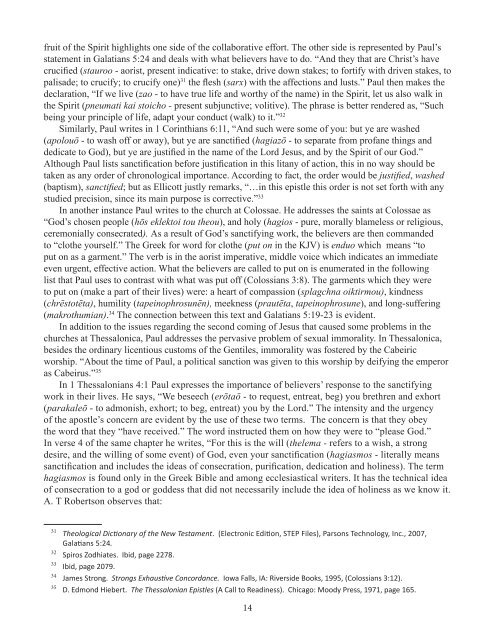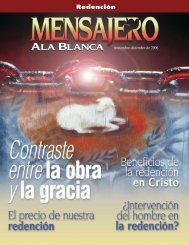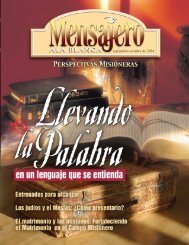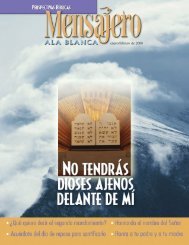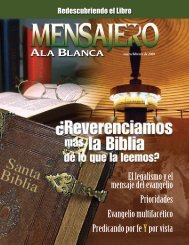The Pursuit of the Holy God - Church of God of Prophecy
The Pursuit of the Holy God - Church of God of Prophecy
The Pursuit of the Holy God - Church of God of Prophecy
You also want an ePaper? Increase the reach of your titles
YUMPU automatically turns print PDFs into web optimized ePapers that Google loves.
fruit <strong>of</strong> <strong>the</strong> Spirit highlights one side <strong>of</strong> <strong>the</strong> collaborative effort. <strong>The</strong> o<strong>the</strong>r side is represented by Paul’s<br />
statement in Galatians 5:24 and deals with what believers have to do. “And <strong>the</strong>y that are Christ’s have<br />
crucified (stauroo - aorist, present indicative: to stake, drive down stakes; to fortify with driven stakes, to<br />
palisade; to crucify; to crucify one) 31 <strong>the</strong> flesh (sarx) with <strong>the</strong> affections and lusts.” Paul <strong>the</strong>n makes <strong>the</strong><br />
declaration, “If we live (zao - to have true life and worthy <strong>of</strong> <strong>the</strong> name) in <strong>the</strong> Spirit, let us also walk in<br />
<strong>the</strong> Spirit (pneumati kai stoicho - present subjunctive; volitive). <strong>The</strong> phrase is better rendered as, “Such<br />
being your principle <strong>of</strong> life, adapt your conduct (walk) to it.” 32<br />
Similarly, Paul writes in 1 Corinthians 6:11, “And such were some <strong>of</strong> you: but ye are washed<br />
(apolouō - to wash <strong>of</strong>f or away), but ye are sanctified (hagiazō - to separate from pr<strong>of</strong>ane things and<br />
dedicate to <strong>God</strong>), but ye are justified in <strong>the</strong> name <strong>of</strong> <strong>the</strong> Lord Jesus, and by <strong>the</strong> Spirit <strong>of</strong> our <strong>God</strong>.”<br />
Although Paul lists sanctification before justification in this litany <strong>of</strong> action, this in no way should be<br />
taken as any order <strong>of</strong> chronological importance. According to fact, <strong>the</strong> order would be justified, washed<br />
(baptism), sanctified; but as Ellicott justly remarks, “…in this epistle this order is not set forth with any<br />
studied precision, since its main purpose is corrective.” 33<br />
In ano<strong>the</strong>r instance Paul writes to <strong>the</strong> church at Colossae. He addresses <strong>the</strong> saints at Colossae as<br />
“<strong>God</strong>’s chosen people (hōs eklektoi tou <strong>the</strong>ou), and holy (hagios - pure, morally blameless or religious,<br />
ceremonially consecrated). As a result <strong>of</strong> <strong>God</strong>’s sanctifying work, <strong>the</strong> believers are <strong>the</strong>n commanded<br />
to “clo<strong>the</strong> yourself.” <strong>The</strong> Greek for word for clo<strong>the</strong> (put on in <strong>the</strong> KJV) is enduo which means “to<br />
put on as a garment.” <strong>The</strong> verb is in <strong>the</strong> aorist imperative, middle voice which indicates an immediate<br />
even urgent, effective action. What <strong>the</strong> believers are called to put on is enumerated in <strong>the</strong> following<br />
list that Paul uses to contrast with what was put <strong>of</strong>f (Colossians 3:8). <strong>The</strong> garments which <strong>the</strong>y were<br />
to put on (make a part <strong>of</strong> <strong>the</strong>ir lives) were: a heart <strong>of</strong> compassion (splagchna oiktirmou), kindness<br />
(chrēstotēta), humility (tapeinophrosunēn), meekness (prautēta, tapeinophrosune), and long-suffering<br />
(makrothumian). 34 <strong>The</strong> connection between this text and Galatians 5:19-23 is evident.<br />
In addition to <strong>the</strong> issues regarding <strong>the</strong> second coming <strong>of</strong> Jesus that caused some problems in <strong>the</strong><br />
churches at <strong>The</strong>ssalonica, Paul addresses <strong>the</strong> pervasive problem <strong>of</strong> sexual immorality. In <strong>The</strong>ssalonica,<br />
besides <strong>the</strong> ordinary licentious customs <strong>of</strong> <strong>the</strong> Gentiles, immorality was fostered by <strong>the</strong> Cabeiric<br />
worship. “About <strong>the</strong> time <strong>of</strong> Paul, a political sanction was given to this worship by deifying <strong>the</strong> emperor<br />
as Cabeirus.” 35<br />
In 1 <strong>The</strong>ssalonians 4:1 Paul expresses <strong>the</strong> importance <strong>of</strong> believers’ response to <strong>the</strong> sanctifying<br />
work in <strong>the</strong>ir lives. He says, “We beseech (erōtaō - to request, entreat, beg) you brethren and exhort<br />
(parakaleō - to admonish, exhort; to beg, entreat) you by <strong>the</strong> Lord.” <strong>The</strong> intensity and <strong>the</strong> urgency<br />
<strong>of</strong> <strong>the</strong> apostle’s concern are evident by <strong>the</strong> use <strong>of</strong> <strong>the</strong>se two terms. <strong>The</strong> concern is that <strong>the</strong>y obey<br />
<strong>the</strong> word that <strong>the</strong>y “have received.” <strong>The</strong> word instructed <strong>the</strong>m on how <strong>the</strong>y were to “please <strong>God</strong>.”<br />
In verse 4 <strong>of</strong> <strong>the</strong> same chapter he writes, “For this is <strong>the</strong> will (<strong>the</strong>lema - refers to a wish, a strong<br />
desire, and <strong>the</strong> willing <strong>of</strong> some event) <strong>of</strong> <strong>God</strong>, even your sanctification (hagiasmos - literally means<br />
sanctification and includes <strong>the</strong> ideas <strong>of</strong> consecration, purification, dedication and holiness). <strong>The</strong> term<br />
hagiasmos is found only in <strong>the</strong> Greek Bible and among ecclesiastical writers. It has <strong>the</strong> technical idea<br />
<strong>of</strong> consecration to a god or goddess that did not necessarily include <strong>the</strong> idea <strong>of</strong> holiness as we know it.<br />
A. T Robertson observes that:<br />
31 <strong>The</strong>ological Dictionary <strong>of</strong> <strong>the</strong> New Testament. (Electronic Edition, STEP Files), Parsons Technology, Inc., 2007,<br />
Galatians 5:24.<br />
32 Spiros Zodhiates. Ibid, page 2278.<br />
33 Ibid, page 2079.<br />
34 James Strong. Strongs Exhaustive Concordance. Iowa Falls, IA: Riverside Books, 1995, (Colossians 3:12).<br />
35 D. Edmond Hiebert. <strong>The</strong> <strong>The</strong>ssalonian Epistles (A Call to Readiness). Chicago: Moody Press, 1971, page 165.<br />
14


